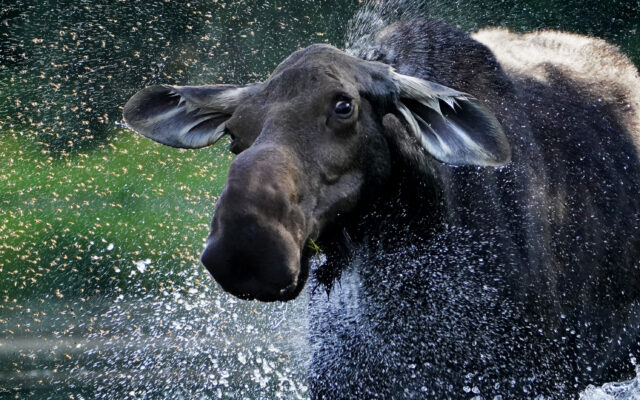
Here’s what you need to know for Saturday’s Maine moose hunt permit lottery
By Pete Warner, Bangor Daily News Staff
This is the week Maine hunters dream about all year.
On Saturday, the Maine Department of Inland Fisheries and Wildlife will set up under a tent in Augusta and read the names of the 4,106 individuals who have been selected for the annual moose hunt.
More than 72,000 people submitted applications for the lottery in the hope of pursuing the state’s largest game animal in the rugged and often remote forest of Maine. For some, given long odds on receiving a permit, the chance to hunt moose may even be a once-in-a-lifetime activity.
The live reading of the hunters selected by a complicated computer program begins at 2 p.m. Saturday at Mill Park in Augusta.
If you can’t make it to the capital, you can visit the Bangor Daily News website, where the list of those who’ll receive permits will be published at no later than 6 p.m. Saturday. The information also will be available on the DIF&W website.
The announcements are part of a daylong series of events designed to bring moose hunters and their families together to celebrate the possibility of being chosen.
Saturday’s activities in Augusta will begin at 10 a.m. and will include a cornhole tournament, “Moose Maine-iah” monster truck rides, food trucks and exhibits from vendors, guides and lodges.
The beer garden, featuring music by the Pat Colwell Band, gets underway at 11 a.m. Stage presentations, including a moose calling demonstration, are slated for 1 p.m.
The state issues moose permits in four ways. The first is through separate chance drawings: one for Maine residents, another for nonresident hunters and a third for the adaptive management zone.
Maine also offers some permits in other ways including via auction, for a controlled moose hunt for disabled veterans and through a hunting lodge lottery system. Ninety percent of all permits handed out in Maine’s 20 eligible Wildlife Management Districts are reserved for residents, while 8 percent go to nonresidents and 2 percent are provided to hunting lodges.
Last year, the state received 69,551 applications. Of those, 45,302 were Maine residents and 24,249 were nonresidents.
The 3,692 permits in 2022 provided to residents provided for an 8.1 percent selection rate, approximately one permit for every 12 applicants. Nonresidents got 308 permits, given them a 1.3 percent chance of earning a permit — about one for every 79 applicants.
Maine boasts the largest moose population in the continental United States, a herd estimated at between 60,000 and 70,000 animals. And while that’s a lot of moose, the state’s population has declined slightly in recent years, due in part to mortality of calves caused by winter tick infestations.
A reduction in moose numbers, combined with changes in forestry practices that have reduced the size of forest parcels harvested for timber, hunters’ reliance on trying to locate moose by riding the roads in their vehicles, and more frequent unseasonably warm weather, have led to less hunter success in recent years.
In 2022, hunters experienced the least successful season statistically since the inception of the modern moose hunt in 1980. During the traditional statewide hunt — not taking into consideration the adaptive unit season — 62 percent of hunters (2,199 of 3,530) successfully killed a moose.
It is part of an ongoing decline in moose hunting success, as fewer than 70 percent of hunters killed a moose for the third time in the last four years.
That said, it shouldn’t be lost on hunters that the Maine moose hunt remains a valuable outdoors experience during which the vast majority of participants are successful.
The adaptive unit hunt provides hunters with a targeted opportunity to harvest female moose (cows) and calves in WMD 4A, the western half of WMD 4. There, the focus is on attempting to reduce the population significantly enough to enable biologists to determine whether doing so can reduce the impact of winter ticks.
Although hunter success in the adaptive hunt has been relatively low (39 percent) in the first two years, participants in the program this year who were unsuccessful during their designated hunt will have the chance to return to the area the week of Nov. 6 to Nov. 11 for a second opportunity.
Another change for the 2023 hunt will allowed hunters selected for certain zones to utilize two different WMDS. Previously, people chosen for WMD 27 or WMD 28 could shoot a moose in either zone. This year, under the same arrangement, the state has paired WMDs 7 and 13 (140 antlered permits), WMDs 12 and 15 (40 antlered permits), and WMDs 14 and 17 (40 antlered permits).
Biologists believe the change will provide more opportunities to hunt and increase the harvest in places where moose are less plentiful and harvest numbers are generally low.
Maine’s hunt is not simply a recreational opportunity, rather a tool by which the state manages the moose population. By modifying the number and type of moose permits available to hunters, the department can help control the population to provide for hunting and viewing opportunities, maintain a healthy moose population, and limit the number of moose/vehicle accidents.